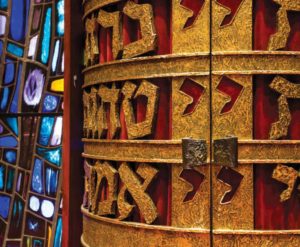Marvin Wilson’s article on evangelicals and interfaith dialogue contains some marvelous mini-definitions of what such dialogue is all about. It involves building “bridges of understanding and dynamic engagement” with adherents of other faiths, he writes. It consists of “respectful conversation and shared experiences” leading to “mutual enrichment and trust.” That is a beautiful description of the sort of dialogue that Wilson himself has been involved in and has shared with others over so many years. One can only envy the students in his classes at Gordon College who had the experience of not only visiting synagogue services but also participating in Jewish holiday observances, visiting Jewish day schools, funeral homes, and other sites, and also—as one learns from Dr. Wilson’s new book Exploring Our Hebraic Heritage—experiencing Jewish and Israeli music through the gifts of his wife Polly.1
To what end? As the author entitles the essay, “to know and be known.” The “to know” part—the learning—can be indeed be gained through the college classroom, especially when it includes experiential learning. One clear conclusion to be drawn from Dr. Wilson’s example is that all evangelical Christian colleges (of which there are at least 120 in North America, even by the strict definition of the Council for Christian Colleges and Universities2) should offer at least one such course. This can be a course on Judaism as such, on the Jewish roots of Christianity, on the fraught history of Christian-Jewish relations, or some mixture thereof. This is part of these colleges’ basic mission to convey to their students the essence of the Christian faith and its career in Western culture. (Is there an entity that surveys the colleges to see to what extent this is being done, and to encourage it?)
As to the situation in local communities, it is true that there are many parts of America, despite our increasingly heterogeneous culture, where it is still possible to grow up without personally knowing any Jews, or Muslims for that matter. I myself had the good fortune to grow up in a small city in the Northeast (Allentown, PA, population about 100,000) that had, and still has, a sizable Jewish minority. Thus a good number of my friends and classmates from elementary school onward were Jewish, and observing how well most of them did in school prepared me to learn later how high a proportion of winners of Nobel prizes and similar awards were Jewish.3 But it was only later, when I encountered the thought of the great Jewish philosopher/theologian Abraham Joshua Heschel, and then got to know him personally, that I appreciated the full richness of the Jewish heritage. I have detailed in an autobiographical article how as a young Lutheran seminarian, I found in Heschel’s book Man Is Not Alone (which I am sure he today would title Humanity Is Not Alone) an evocation of the reality of God that I had not encountered hitherto in any Christian writing.4
If there are indeed Jews in one’s local community or nearby, then what I would suggest as an initial approach, following Wilson’s advice to begin with small steps, is to take advantage of any “Open House” that a local synagogue might announce—or, if there is none on the agenda, to take the initiative in suggesting that such an event be planned, and that there would be a positive response to it. This kind of occasion, on a weekday evening or a Sunday afternoon, allows the Jewish partners to be on their own ground and gives the Christian visitors plenty to look at (the sacred objects in the sanctuary) and listen to (explanations by the rabbi or lay members). This may or may not lead, on one or more future occasions, to dialogue in the strict sense, which involves direct conversations about matters of personal faith. It is at this point that the further guidelines that Dr. Wilson offers become so important: be ready first to listen, then speak; recognize the signs of “common grace,” that is, of the Spirit’s working also in the lives of those outside the church; remember that we presently know only in part; and be willing to live with dialectical tensions, paradoxes, and ambiguities.
The nineteenth-century poet Samuel Taylor Coleridge spoke of a “willing suspension of disbelief” as essential to giving credence to a literary narrative. Perhaps what we have here, in faith’s willingness to tread softly, contrary to its inner urge, is a “willing suspension of belief”—not in the sense of denying one’s convictions, but putting them “on hold” for the moment, out of respect and even reverence for the integrity of the other. It may also be close to what the philosopher Edmund Husserl meant by epoché, the “bracketing”of the truth of a matter while it is being investigated.
There is another way in which I would put it. Taking inspiration from Dietrich Bonhoeffer’s lectures on Christology, Christ the Center,5 I would say, if we hold fast to Christ as the center—of our own lives and indeed of human history—then we can be quite open at the circumference. Indeed, we can say with the ancient philosopher, nihil humanum alienum mihi est (nothing human is alien to me), and rejoice in the astonishing assertion of St. Paul, “all things are yours” (1 Cor 3:21).
In the online version of his article, Dr. Wilson expands much of what he says about Christian-Jewish relations to Christian-Muslim relations, an even more difficult matter in view of today’s polarized views about Islam. I would join in urging this further outreach wherever possible, for surely our Muslim neighbors are deeply in need of our understanding and support. Once again, Wilson’s precepts about beginning with small steps, and so forth, are of great importance.
One topic that Dr. Wilson does not deal with in his article, though it is of pivotal significance in evangelical-Jewish relations, is that of attitudes toward the State of Israel. The Jewish community greatly appreciates what it sees as fervent and loyal support of the State of Israel among evangelicals, as compared to the aspersions cast upon it from other quarters. Most mainstream Protestant denominations, on the other hand, try to balance their support of the aspirations of the Palestinian people with their affirmation also of Israel’s rightful claims. They view the evangelical position as often naively uncritical of Israel’s policies, which is especially ironic in view of the lively debate and dissent within Israel itself—in public opinion, in the press, and in parliament—over just about any given policy. Here there is a need for ongoing intra-Christian as well as interfaith conversation.
In closing, one can only express both appreciation and admiration for Dr. Wilson’s many contributions, both in writing and in person, to Christian-Jewish dialogue. He has been a true pioneer and a stalwart servant-leader in this field.
ENDNOTES
1Marvin R. Wilson, Exploring Our Hebraic Heritage: A Christian Theology of Roots and Renewal (Grand Rapids: Eerdmans, 2014), xxvii.
2It includes only colleges where all faculty members must be professing Christians. See www.cccu.org/members_and_affiliates.
3One estimate is that Jews have received 22% of all Nobel Prizes since they were originated, even though they constitute only 0.2% of the world’s population. For a rather light-hearted “explanation” of this, see www.jewishjournal.com/thebulletinbored/item/5_reasons_jews_win_so_many_nobel_prizes.
4Abraham Joshua Heschel, Man Is Not Alone: A Philosophy of Religion (New York: Farrar, Straus & Young, 1951). For the autobiographical article referred to, see Franklin Sherman, “Steps Along the Way,” in Faith Transformed: Christian Encounters with Jews and Judaism, ed. John C. Merkle (Collegeville, MN: Liturgical Press, 2003). It is significant that Marvin Wilson, in his new book, also pays eloquent tribute to his indebtedness to Heschel.
5Translated by Edwin H. Robertson (New York: Harper & Row, 1978). A more recent translation has appeared in the Dietrich Bonhoeffer Works series, vol. 12: Berlin 1932–1933 (Philadelphia: Fortress, 2009), 299–360.


